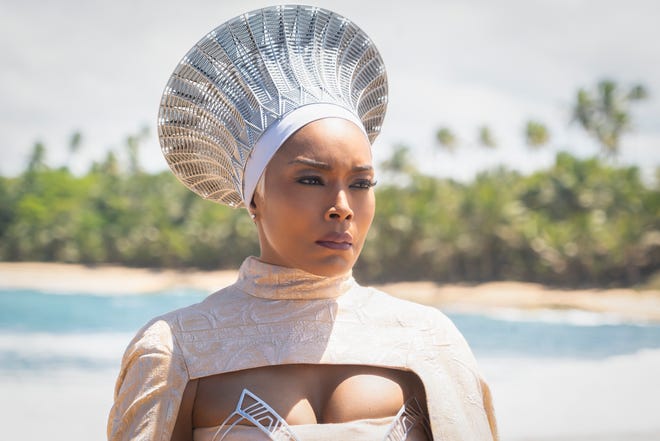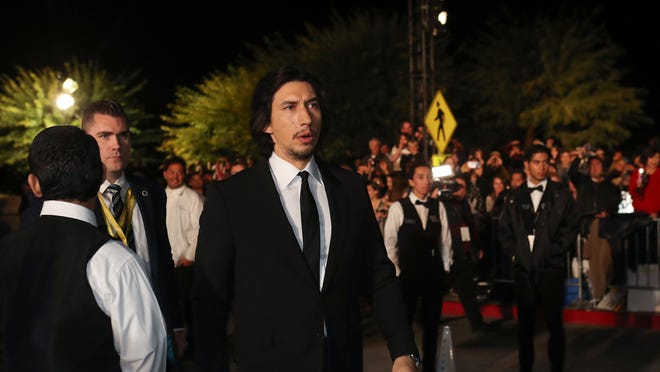It’s been a while since patrons of the Palm Springs International Film Festival stood in line outside theaters discussing their love of cinema with one another, or since the festival offered the chance to sit in a dark theater together, laughing, crying and gasping through the collective experience of the silver screen.
That phenomenon is back this year, but fans of the Palm Springs International Film Festival may notice there are fewer films to choose from. However, among the more limited 2023 offerings are some of the most talked-about and critically acclaimed foreign films to date.
This year, the 2023 festival will screen 134 films, compared to 188 films in 2020. Artistic Director Lili Rodriguez said the reduced screenings will allow for COVID-19 protocols, such as theater cleaning and more time for passholders to travel between theaters.
The Palm Springs International Film Festival returns in person for the first time in three years and will take place Jan. 6 through Jan. 16, with the Film Awards kicking the celebrations off on Jan. 5 at the Palm Springs Convention Center.
Attendees will be asked to show proof of vaccination at screenings, while masking will be strongly encouraged. Theaters will limit attendance to 75% capacity.
Star-studded affair
While the COVID-19 pandemic has kept the festival and filmmakers away from local crowds, this year’s event promises to be a star-studded affair.
After an evening with several well-known filmmakers at the Palm Springs International Film Awards, the festival officially kicks off with the world premiere of “80 For Brady” on Jan. 6. The film stars Hollywood legends Lily Tomlin, Jane Fonda, Rita Moreno and Sally Field as four best friends living life to the fullest when they decide to take a wild trip to the 2017 Super Bowl LI to see seven-time Super Bowl champion Tom Brady. The quarterback also appears in the film and is a producer.
All four leading ladies, along with other members of the cast, will be in town during the premiere. “80 For Brady” is in theaters everywhere Feb. 3.

Rodriguez said the film was the right one for opening night so that it could “put people in a good mood,” especially coming out from the height of the COVID-19 pandemic.
“The most important part of it is at the heart of it there’s a lot of love and joy in it,” she said. “It’s wonderful to see the women on stage, and the opportunity to have them in Palm Springs was something that we couldn’t pass up.”
Several other actors and filmmakers are expected to make their way to the desert as well.
Looking at just the Talking Pictures screenings, they will bring in honorees Colin Farrell of “The Banshees of Inisherin” (10 a.m. Jan. 6) and Bill Nighy of “Living” (11 a.m. Jan. 6); Angela Bassett and costume designer Ruth E. Carter of “Black Panther: Wakanda Forever” (11 a.m. Jan. 6); “Moving On” director Paul Weitz (3 p.m. Jan. 8); “The Son” director Florian Zeller (6:30 p.m. Jan. 10); “Chevalier” director Stephen Williams (11 a.m. Jan. 14); and Anna Kendrick of “Alice, Darling” (3 p.m. Jan. 14).

Female-led films
This year’s festival features a wide swath of female-led films, both on screen and behind the cameras.
Programmer Hebe Tabachnik said many different programs and grants around the world have focused on promoting and supporting women in the industry. It’s no wonder then, she said, why so many female directors and writers are featured at the Palm Springs festival and others.
She highlighted “Alcarràs” director Carla Simón, whose film won the coveted Golden Bear at the Berlin International Film Festival. It was also chosen as Spain’s submission for Best International Feature Film at the 90th Academy Awards.
“It kind of proves the talent, but also the energy of these new voices,” Tabachnik said.

Other favorites include “Chile ’76” by Manuela Martelli, set during the early days of Augusto Pinochet’s dictatorship and how one woman flirts with political engagement, and “Lullaby” by Alauda Ruiz de Azúa, which Tabachnik called “beautiful” and “tender” as it focuses on a young mother overwhelmed by parenthood. The film also received high praise from legendary Spanish director Pedro Almodóvar, calling it “undoubtedly the best debut in Spanish cinema for years.”
Similarly, around half of the films from east and southeast Asian countries that will be screened at the festival come from female directors, programmer Brian Hu said.
One that stands out is the documentary “Liquor Store Dreams” by So Yun Um, about the filmmaker growing up in her parents’ liquor store, one of many Korean-owned shops in the predominantly Black South Los Angeles area, and what it means to be a second generation “liquor store baby” in a post-George Floyd America.

“It’s not only a great story about a second generation immigrant, but what it means to be a female director,” Hu said. “The film is about her navigating these pressures of taking over the family business versus what does it mean to represent myself.”
Other notable highlights include “Next Sohee” by July Jung, about a high school student trained in the dark arts of persuading customers out of canceling their service at a call center, and “Stonewalling” by Huang Ji and Ryuji Otsuka, about a young woman, with plans to learn English and become a flight attendant, learning she’s pregnant.
LGBTQ+ films
In recent years, the LGBTQ+ films category, Queer Cinema Today and the Gayla, has moved beyond stories featuring romantic comedies and sainted characters. Programmer David Ansen credits this shift to “second generation filmmakers” bringing new themes. He used French filmmaker Christophe Honoré’s film “Winter Boy,” about a teenage boy enduring a tragic event and grieves by taking on risky sexual encounters, as an example.
“It’s incredibly honest and moving,” Ansen said. “There’s no special pleading and it’s accepting the fact of ‘we’re gay and we’re here.'”

Tabachnik discussed two films from other categories such as the Brazilian film “Mars One” for having a “natural” LGBTQ+ character, and an Argentinian entry “Sublime” for including a gay character among a group of teenagers. She highlighted the Spanish film “My Emptiness and I” that’s about a transgender woman reflecting on what it means to be a man or a woman.
“She just wants to fall in love, and it’s funny to see her have all these blind dates and it balloons in front of your eyes,” Tabachnik said.
Among the 11 films included in the category, the two Gayla screenings are American films. The documentary “Mama Bears” is about two Christian mothers advocating for LGBTQ rights, and the dramedy “God Save The Queens” follows four drag queens attending a therapy retreat.
Latin American dictatorships and Iranian cinema
“Chile ’76” isn’t the only film about life in Latin America under a dictatorship. Santiago Mitre’s “Argentina, 1985” is the true story of Argentinian prosecutor Luis Moreno Ocampo bringing members of the de facto dictatorship and the junta to justice. Campo and his family lived through ceaseless peril and scare tactics during the trial, and Tabachnik described the scenes featuring two women testifying about the torture as “mastery.”
“The prosecutor balances it with humor and there are people laughing in the same film where they also cry 10 minutes later. It’s interesting how (Mitre) told the story and made it an entertaining court drama,” Tabachnik said.

Similar films, including a documentary about former Chilean president Salvador Allende, have been presented at the festival in the past and more films about the Latin American dictatorships continue to be made. Tabachnik said many younger generations don’t know about these events.
“30,000 people disappeared in Argentina. In the case of Chile, it’s a country that has a different history of how we process the dictatorship and Augusto Pinochet because he lasted longer than any of the other ones in the rest of the countries,” Tabachnik said.
Post-revolutionary Iranian films on subjects of sex, gender roles, political subject matter and more coming out of a highly censored and isolated country continue to receive attention at international film festivals, including the Palm Springs International Film Festival. During the summer, prominent Iranian directors Mostafa al-Ahmad, Mohammad Rasulof and Jafar Panahi were arrested as political protests increased in the country. Iranian Director Asghar Farhadi is also demanding the release of actress Taraneh Alidoosti following a December arrest.
Rodriguez said “Iranian filmmakers have found ways to talk about what’s going on in their countries without talking about it directly,” and highlighted the Ali Abbasi film “Holy Spider” about an Iranian journalist investigating a serial killer in the holy city of Mashhad.
“(Iran) is a country that produces not just a lot of films but really good films,” Rodriguez said. “There’s a lot to be said coming out of there right now and it’s a volatile moment. A lot of filmmakers have things to say about it and it’s important to give them a platform.”
Only 2 films are in the local category this year
This year’s festival will only present two local films, a rerun of the Olivia Wilde film shot in Palm Springs, “Don’t Worry Darling,” and a new documentary “Racist Trees.” Rodriguez said the programmers were “spoiled” in 2022, with five films about or filmed in the desert, but didn’t see as many this year.
“We never had a year like (2022),” Rodriguez said. “It’s always one or two maximum. Last year, we felt like, ‘Is this going to be a trend and are we going to get a lot of (local) films?’ We just didn’t get as many.”
“Don’t Worry Darling,” starring Wilde and British singer Harry Styles, was filmed in Palm Springs at locations such as the Kaufman House designed by Ricard Neutra for Edgar J. Kaufmann, Canyon View Estates, Palm Springs City Hall and more. The film was released in September and took in over $80 million at the box office.

Directors Sara Newens and Mina T. Son’s “Racist Trees” highlights former Desert Sun staff writer Corinne S. Kennedy’s 2017 reporting on a row of tamarisk trees planted at Tahquitz Creek Golf Course blocking the view of the Crossley Tract, a historically Black neighborhood. Residents of the Crossley neighborhood saw the trees as an enduring symbol of racism and inequality and wanted them removed, which received national attention.
“(‘Racist Trees’) elicits some really interesting discussions and I think the movie has some balance to it. It lets different sides speak their minds and raises some thorny questions, but I thought, ‘We’ve got to show this,'” Ansen said.
Ema Sasic covers entertainment and health in the Coachella Valley. Reach her at ema.sasic@desertsun.com or on Twitter @ema_sasic. Brian Blueskye covers arts and entertainment. He can be reached at brian.blueskye@desertsun.com or on Twitter at @bblueskye.









